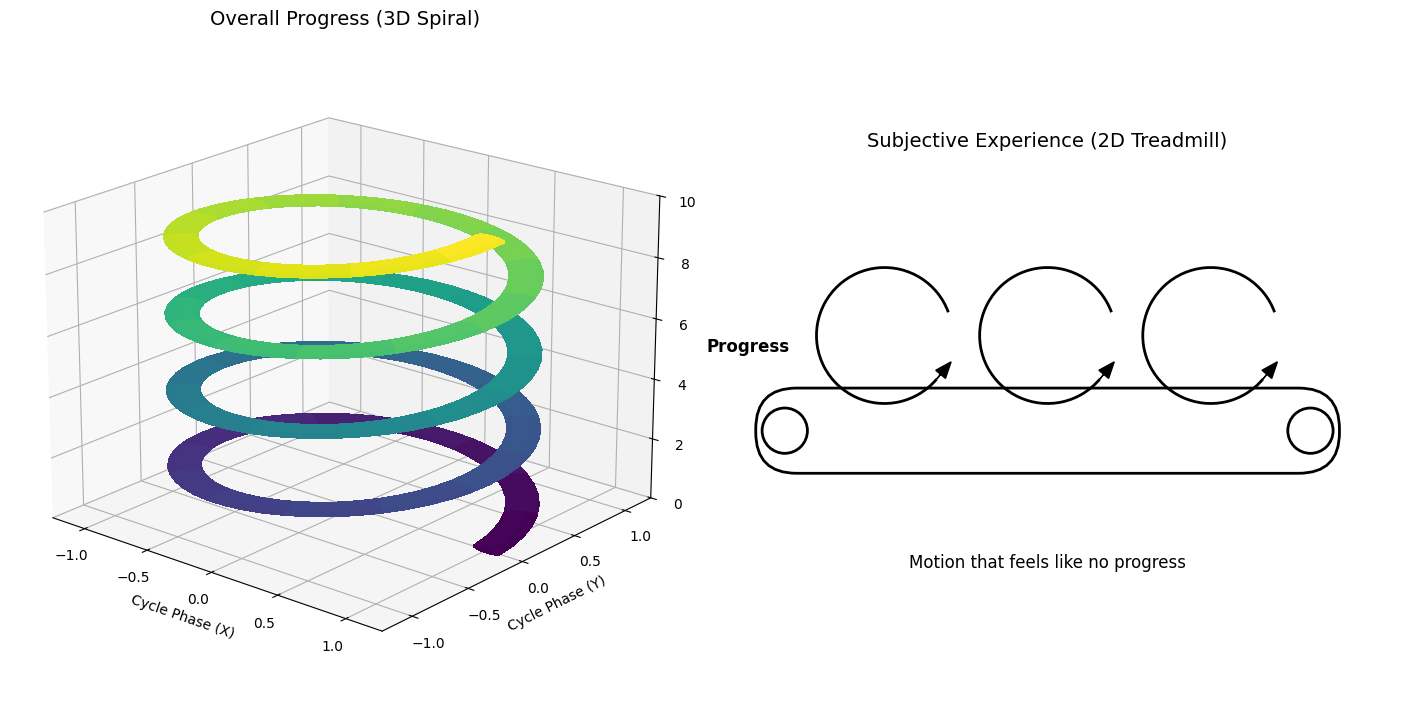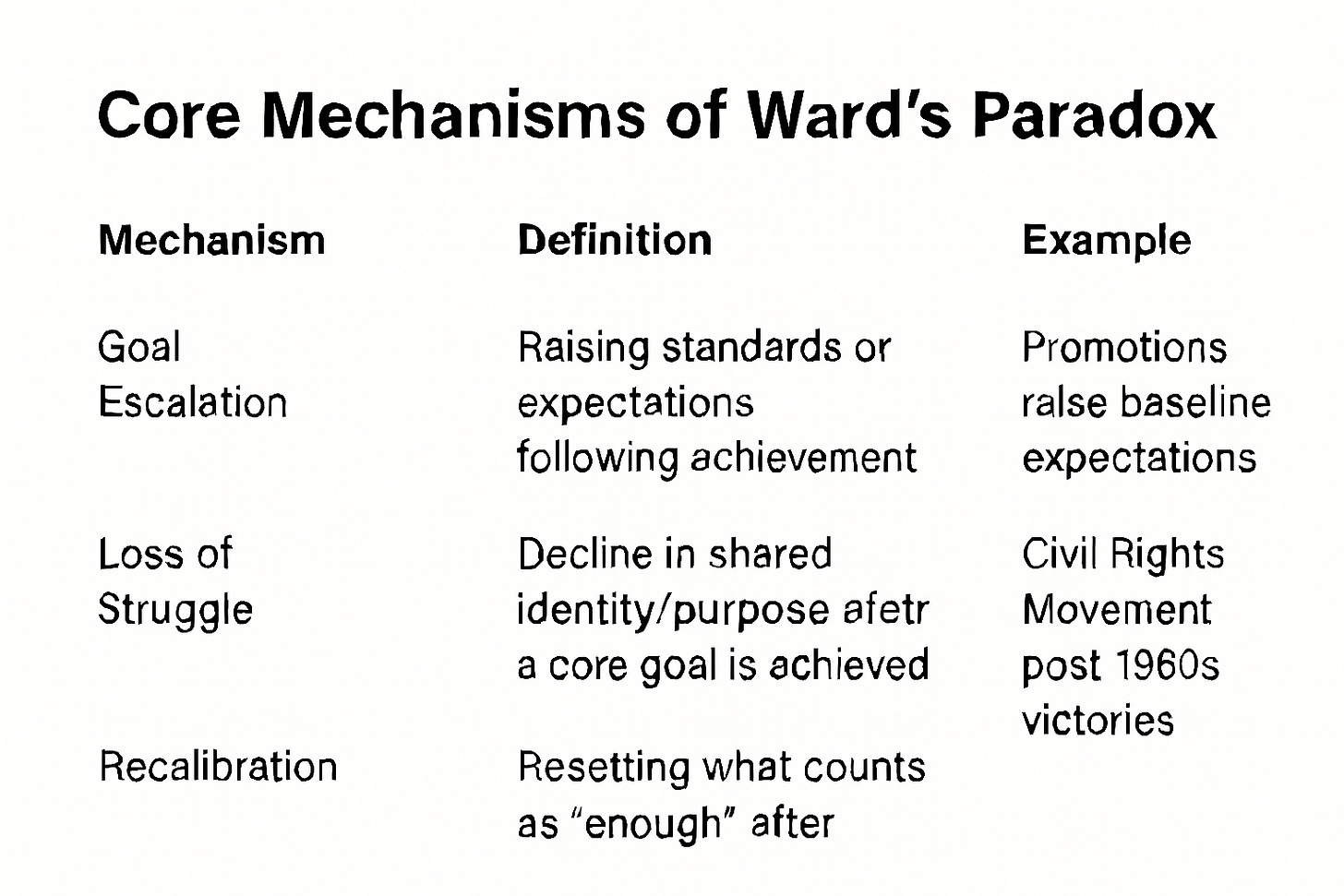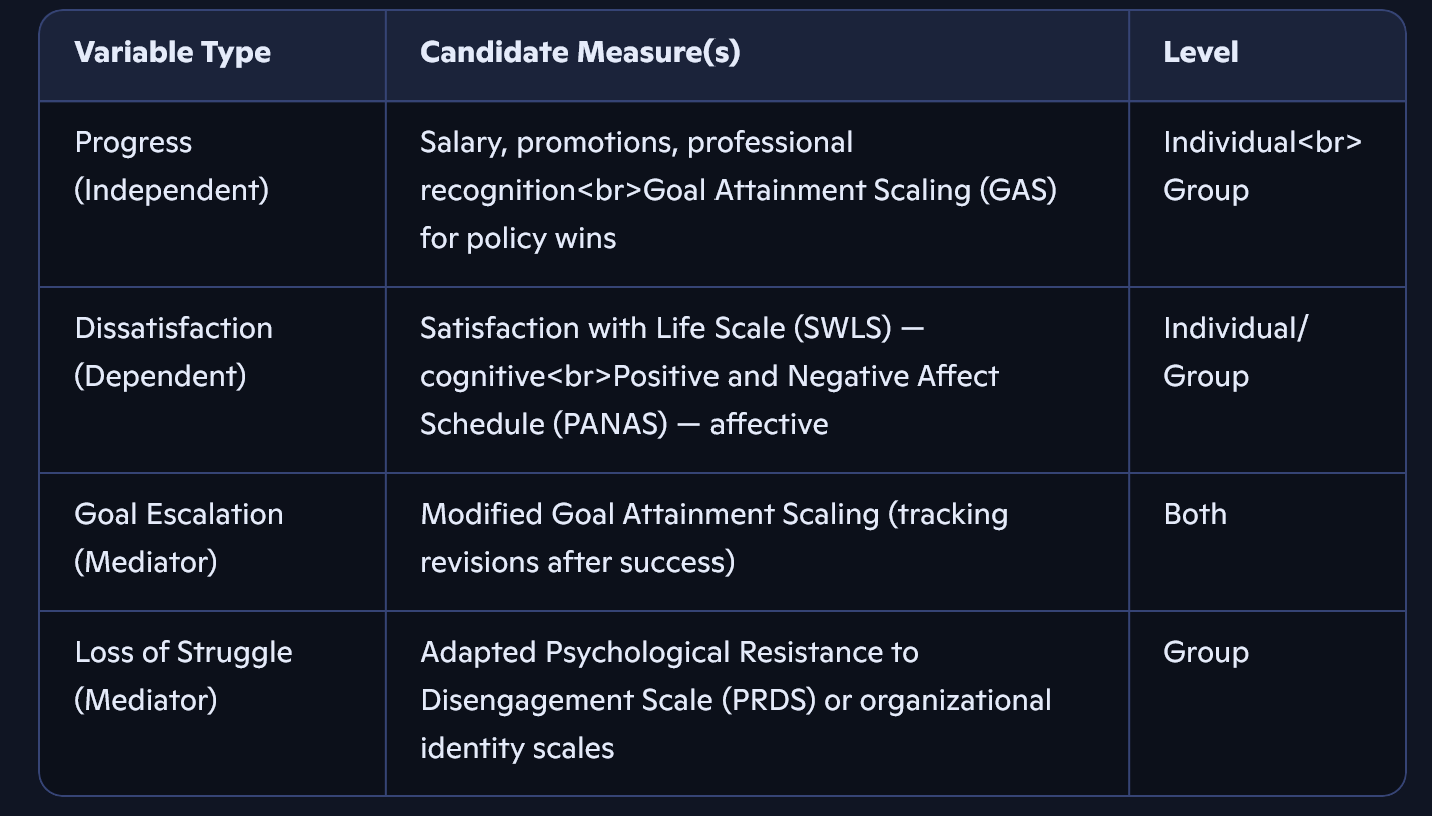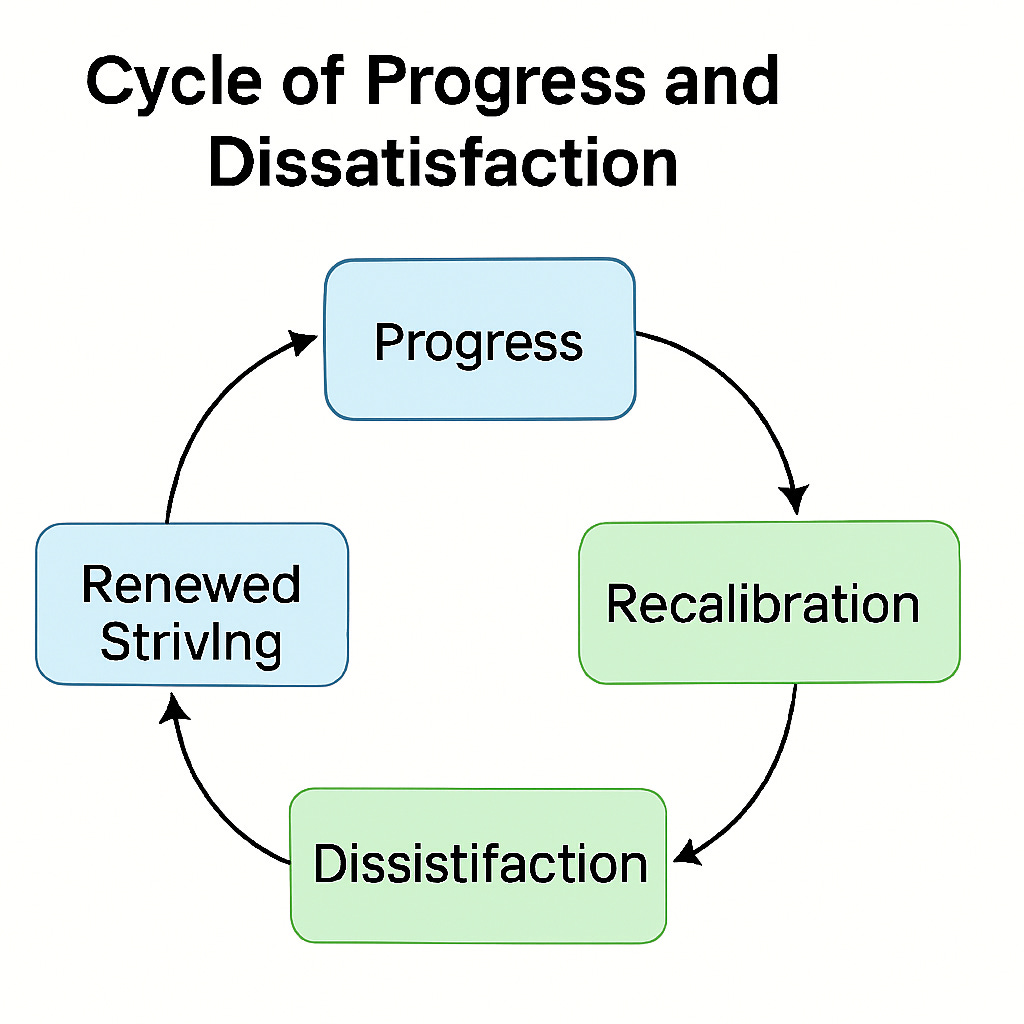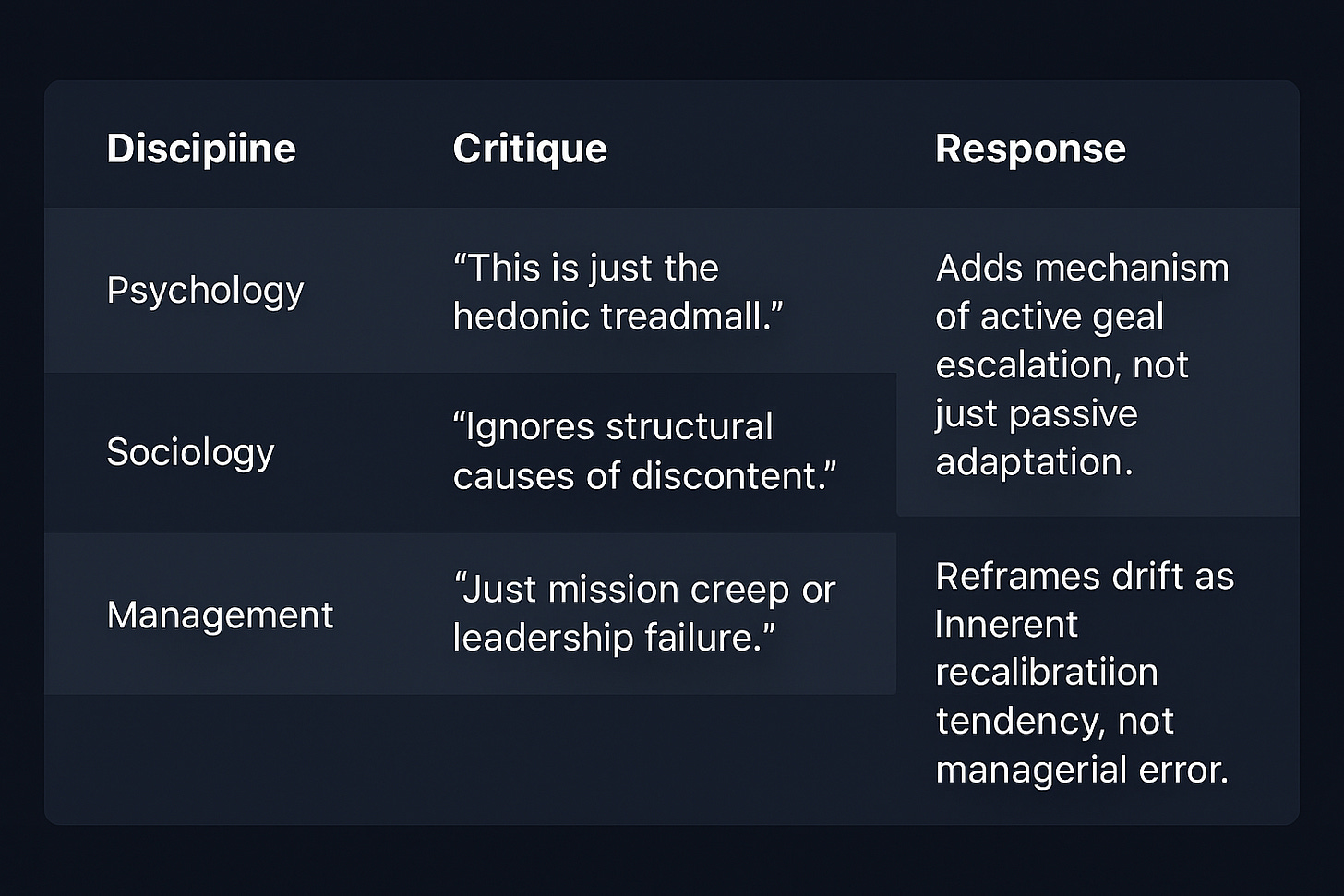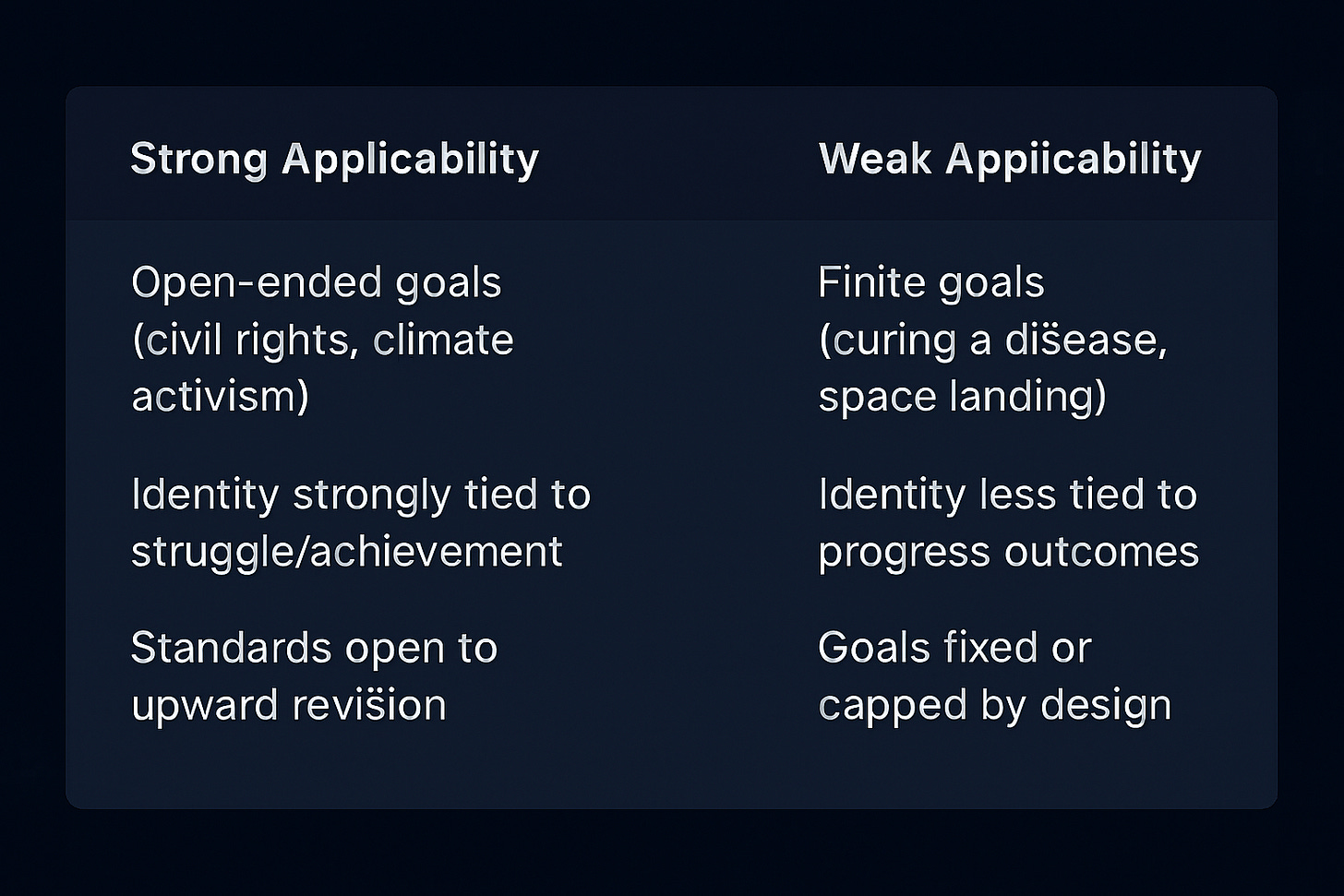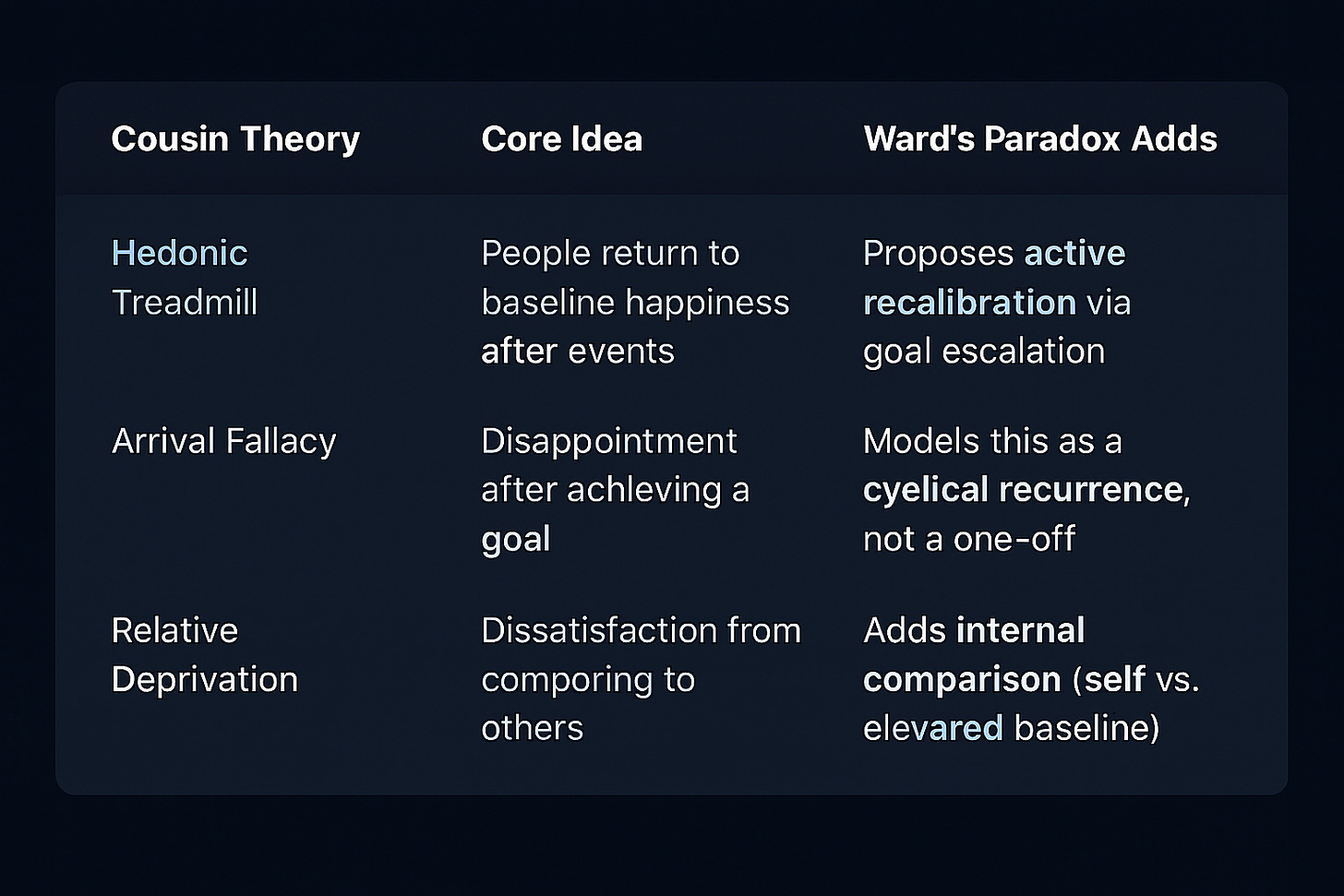Abstract
This paper proposes Ward's Paradox as a conceptual framework for understanding the recurring tension between objective progress and subjective dissatisfaction. The framework suggests that individuals and groups may experience renewed dissatisfaction following achievement through three hypothesized mechanisms: goal escalation, loss of unifying struggle, and recalibration of internal standards. Unlike passive adaptation models, Ward's Paradox proposes that dissatisfaction is actively generated through upward revision of expectations after success. The paper situates this framework within existing theories of hedonic adaptation, relative deprivation, and organizational dynamics while clarifying its distinct contribution. A longitudinal study design is outlined to test falsifiable predictions across individual and group levels. The framework is presented as a testable proposition requiring empirical validation, not as an established law. Case studies from civil rights, labor movements, and climate activism illustrate potential applications, though these remain preliminary evidence. The proposed framework aims to bridge descriptive observations of post-achievement dissatisfaction with a mechanistic understanding suitable for empirical investigation.
Keywords: progress paradox; goal escalation; hedonic adaptation; relative deprivation; conceptual framework; theory construction
Part I: Introduction and Foundational Concepts
A. The Paradox of Progress
Ward's Paradox is proposed as a conceptual framework suggesting that individuals and groups may experience subjective dissatisfaction even after achieving objective progress. This hypothesized pattern is thought to be driven by dynamic, self-reinforcing mechanisms: goal escalation, shifting expectations, and the loss of a unifying struggle. The framework posits that success recalibrates internal standards, which in turn generates new dissatisfaction. This creates a cyclical process that may feel like a "treadmill" to those experiencing it. Yet when viewed more broadly, this cycle can be interpreted as an upward, spiraling movement—a "helix of progress" in which struggles reappear at higher levels of complexity.
Figure 1. Comparison of subjective and structural dynamics in Ward’s Paradox. Left: Overall progress visualized as a 3D upward spiral (helix). Right: Subjective experience visualized as running on a treadmill, which feels repetitive despite cumulative progress.
The paradox, as proposed here, is not that progress is illusory but that its subjective experience may be undermined by the very act of achieving it. The central aim of this paper is to move this idea from descriptive observation toward a testable conceptual framework by situating it within an intellectual lineage and outlining falsifiable hypotheses.
B. Theoretical Foundations: An Intellectual Lineage
The intellectual roots of Ward's Paradox are situated within established frameworks across multiple disciplines, particularly those observing the disconnect between objective achievement and subjective experience. The proposed framework does not claim to replace these perspectives but seeks to integrate and extend them by highlighting a distinct mechanism: the recalibration of standards following success.
1. Psychological and Hedonic Principles
The psychological foundation builds upon hedonic adaptation research. The hedonic treadmill posits that humans tend to return to a baseline level of happiness despite major positive or negative life events (Brickman & Campbell, 1971). Subsequent research has shown that these baselines vary across individuals and can shift over time in response to significant circumstances. Ward's Paradox is proposed as an extension of this work: rather than viewing adaptation as a passive return to baseline, the framework suggests that dissatisfaction may be actively produced through goal escalation following success.
The "arrival fallacy" describes disappointment after achieving long-sought goals (Ben-Shahar, 2007), while post-achievement depression captures the emotional vacuum that can follow completion of major objectives. Ward's Paradox proposes these phenomena reflect a systematic pattern rather than isolated experiences, suggesting that the recalibration of expectations creates a repeating cycle rather than a single episode of disappointment.
Table 1.
2. Sociological and Economic Frameworks
Relative Deprivation Theory explains how dissatisfaction can arise through social comparison, even when objective conditions improve (Runciman, 1966). Ward's Paradox complements this perspective by proposing an additional mechanism: internal comparison with one's own prior standards. When individuals or groups achieve their goals, they may experience dissatisfaction not only relative to others but relative to their newly elevated expectations.
The "revolution of rising expectations" describes how periods of improvement can paradoxically lead to social instability when progress stalls or reverses. Ward's Paradox proposes a cognitive mechanism that might underlie such patterns: the systematic escalation of goals following achievement. Similarly, the Easterlin Paradox demonstrates that national income gains do not translate into sustained increases in reported well-being (Easterlin, 1974). Ward's Paradox suggests this pattern may generalize beyond economics to any domain where progress occurs.
3. Organizational Dynamics
Goal displacement and mission creep describe how organizations may drift from their original purposes (Merton, 1940). Ward's Paradox proposes these phenomena are not merely managerial failures but may reflect the same escalation cycle observed at individual levels. When organizations achieve their stated objectives, they may experience pressure to expand their scope rather than dissolve or maintain focus.
The performance paradox suggests that excessive focus on performance metrics can undermine learning and genuine improvement (Briceño, 2023). This may reflect the hypothesized recalibration pattern: achieving performance targets creates new, higher standards that shift attention away from foundational processes.
C. A Path Toward Falsifiability
For Ward's Paradox to contribute to scientific understanding, it must generate testable predictions. This paper does not claim the framework applies universally but proposes generalizable hypotheses that can be empirically evaluated. The framework emphasizes falsifiable predictions across individual, organizational, and societal levels as its primary scholarly contribution.
The proposed framework makes three core predictions: (1) achievement of significant goals will correlate with upward recalibration of subsequent standards; (2) subjective dissatisfaction will increase following major successes more than following failures; and (3) interventions designed to maintain focus on process rather than outcomes will moderate these effects.
Part II: A Blueprint for a Falsifiable Study
To evaluate Ward's Paradox empirically, a longitudinal, mixed-methods design is proposed. The study would test whether objective progress triggers upward recalibration of standards and subsequent renewed dissatisfaction.
Independent Variable (Progress): At the individual level, career advancement would be measured through salary growth, promotions, and professional recognition. At the group level, policy victories could be quantified using Goal Attainment Scaling (GAS), which provides standardized metrics for diverse qualitative achievements.
Dependent Variable (Dissatisfaction): Subjective well-being would be assessed using established instruments. The Satisfaction with Life Scale (SWLS) would measure cognitive evaluations of life satisfaction (Diener et al., 1985), while the Positive and Negative Affect Schedule (PANAS) would capture affective dimensions of well-being (Watson & Clark, 1988).
Mediating Variables: Goal escalation would be measured through modified GAS protocols that track how participants revise their expectations following achievement. Loss of unifying struggle would be assessed using adapted versions of the Personal Relative Deprivation Scale (PRDS) or organizational identity measures, focusing on changes in group cohesion and shared purpose.
Proposed Cohorts: The study would recruit high-achieving individuals in competitive fields who regularly experience goal attainment, and social movement organizations that have recently achieved significant policy victories. Data collection would occur before, during, and after major achievements to capture the hypothesized recalibration process.
These operationalizations represent suggested approaches rather than definitive prescriptions. They illustrate how Ward's Paradox might be translated from descriptive observation into testable form, though alternative measurement strategies could be equally valid.
Table 2. Proposed Study Design & Measures
Part III: Clarifications of Core Concepts
Relation to Hedonic Adaptation
Ward's Paradox extends hedonic adaptation research by proposing goal escalation as an active driver of adaptation rather than viewing it as a passive return to baseline. While hedonic adaptation focuses on how people adjust to changed circumstances, Ward's Paradox emphasizes how achievement itself may create new circumstances through recalibration of standards.
Terminology
Several key terms require clear definition:
Goal Escalation refers to the systematic raising of standards or expectations following achievement. This is proposed as an active process rather than a passive drift.
Loss of Unifying Struggle describes the hypothesized diminishment of shared identity and purpose that may occur when groups achieve their primary objectives.
Recalibration captures the process by which internal standards shift upward following success, making previously satisfactory outcomes feel inadequate.
Fractal Recurrence represents the hypothesis that similar patterns may appear across multiple levels of analysis, from individual psychology to organizational dynamics to societal change.
Figure 2. Simplified causal loop of Ward’s Paradox (Progress → Recalibration → Dissatisfaction → Renewed Striving → Progress)
The Helix Metaphor
The treadmill metaphor effectively captures the subjective experience of futility that may accompany repeated cycles of striving and dissatisfaction. The helix metaphor is proposed to complement this by illustrating how such cycles might produce cumulative progress over time. The helix should be understood as a heuristic device rather than a literal description. Future work might benefit from developing more precise schematic causal diagrams to supplement metaphorical representations.
Distinctive Contribution
Ward's Paradox proposes to contribute three elements to existing literature: (1) a specific mechanism linking achievement to renewed dissatisfaction through goal escalation and loss of struggle; (2) a multi-level hypothesis suggesting similar patterns across individual, organizational, and societal domains; and (3) an interpretive framework that reframes apparent futility as progressive development.
Part IV: Scholarly Criticisms and Counterarguments
Psychology
Critics from psychology may argue that Ward's Paradox simply restates the hedonic treadmill or arrival fallacy under a new name. The proposed framework addresses this by focusing on active recalibration mechanisms rather than passive adaptation processes. While the hedonic treadmill describes general patterns of adaptation, Ward's Paradox specifies how goal escalation may drive this process. Additionally, while the arrival fallacy treats post-achievement disappointment as an isolated cognitive error, Ward's Paradox models it as part of a repeating cycle that may serve developmental functions.
Sociology
Sociological critics may argue that the framework overemphasizes subjective experiences while ignoring structural causes of dissatisfaction. Ward's Paradox is proposed as complementary to rather than competitive with structural analyses. The framework suggests that structural changes produce new subjective realities, and that dissatisfaction following victory is not pathological but represents a predictable next phase in social development. For example, legal victories in civil rights may reveal new forms of structural inequality, creating both objective problems and subjective dissatisfaction.
Management and Organizational Theory
Critics from management theory may argue that goal escalation and mission creep represent simple failures of leadership rather than systematic patterns requiring theoretical explanation. Ward's Paradox proposes that these phenomena reflect deeper mechanisms: the inherent human tendency to seek new challenges after achieving previous goals. This suggests that effective management requires understanding and channeling these tendencies rather than simply preventing them.
Prescriptive Elements
Any suggestions for practical interventions, such as adopting a "compass principle" that emphasizes integration over accumulation, should be viewed as hypotheses for future testing rather than validated recommendations. The framework's prescriptive implications require empirical evaluation before being implemented as interventions.
Table 3. Anticipated Criticisms and Responses
Part V: Evidence Standards and Limitations
Neurobiological Mechanisms
Research on dopamine systems suggests that motivation peaks during goal pursuit and declines following attainment (Berridge & Robinson, 1998). This may help explain the neurochemical basis for post-achievement dissatisfaction proposed by Ward's Paradox. However, no direct neurobiological studies of the specific mechanisms proposed here have been conducted. These biological hypotheses should be treated as speculative propositions requiring interdisciplinary investigation.
Case Study Evidence
Historical examples from civil rights activism, labor movements, and climate policy illustrate how progress in these domains may have led to recalibration of expectations and renewed struggle. The Civil Rights Movement's shift from legal equality to systemic racism, labor's evolution from basic organizing rights to work-life balance concerns, and climate activism's escalation from the Paris Agreement to more ambitious targets all suggest patterns consistent with Ward's Paradox.
However, these cases represent illustrative rather than confirmatory evidence. They demonstrate plausibility rather than proof. Comparative studies examining movements that did not follow these patterns would be necessary to evaluate the framework's generalizability.
Boundary Conditions
The proposed framework is hypothesized to apply most strongly in contexts where goals are open-ended and where identity is closely tied to struggle or achievement. It may apply less strongly in contexts with clearly finite objectives, such as curing specific diseases or completing defined projects. Additionally, the framework may operate differently across cultures with varying values regarding achievement and progress.
These boundary conditions require empirical validation. The framework's scope and limitations can only be established through systematic investigation across diverse contexts.
Table 4. Hypothesized Boundary Conditions
Current Evidence Status
Ward's Paradox currently rests on conceptual synthesis, illustrative case material, and speculative neurobiological hypotheses. Its scholarly contribution lies in articulating falsifiable predictions and proposing a testable framework rather than claiming universal proof. The framework should be evaluated based on its potential to generate productive research programs rather than on its immediate empirical support.
Part VI: Conclusion and Future Directions
This paper proposes Ward's Paradox as a conceptual framework for understanding the recurring tension between objective progress and subjective dissatisfaction. The framework's contribution lies in synthesizing scattered observations into a mechanism-based, testable proposition that can guide empirical investigation.
Future research should prioritize implementing longitudinal designs to test the framework's core predictions. Studies should explore how personality factors, cultural values, and contextual variables moderate the proposed relationships. Additionally, research should evaluate interventions designed to help individuals and organizations navigate the hypothesized cycles more effectively, such as fostering process-oriented rather than outcome-oriented mindsets.
The framework also suggests productive directions for interdisciplinary collaboration. Neurobiological research could examine the dopaminergic mechanisms proposed to underlie goal escalation. Sociological investigation could explore how the framework applies to social movements and institutional change. Organizational research could test interventions designed to manage mission expansion and goal displacement.
Ward's Paradox, as hypothesized here, is not an indictment of progress but a proposed model of its dynamics. The framework suggests that dissatisfaction following achievement may serve as the fuel that propels continued development. If validated, this perspective could reframe apparent setbacks as necessary components of a broader developmental process.
The framework requires extensive empirical evaluation before its validity can be established. However, its potential contribution lies in providing a structured approach to investigating phenomena that have previously been treated as separate or anomalous. By proposing specific mechanisms and testable predictions, Ward's Paradox may help bridge the gap between descriptive observations of post-achievement dissatisfaction and systematic scientific understanding of these patterns.
Table 5: Ward’s Paradox and Comparative Frameworks
References
Ben-Shahar, T. (2007). Happier: Learn the secrets to daily joy and lasting fulfillment. McGraw-Hill.
Berridge, K. C., & Robinson, T. E. (1998). What is the role of dopamine in reward: Hedonic impact, reward learning, or incentive salience? Brain Research Reviews, 28(3), 309-369.
Briceño, E. (2023). The performance paradox: Turning the power of mindset into action. Ballantine Books.
Brickman, P., & Campbell, D. T. (1971). Hedonic relativism and planning the good society. In M. H. Appley (Ed.), Adaptation-level theory (pp. 287-305). Academic Press.
Diener, E., Emmons, R. A., Larsen, R. J., & Griffin, S. (1985). The Satisfaction with Life Scale. Journal of Personality Assessment, 49(1), 71-75.
Easterlin, R. A. (1974). Does economic growth improve the human lot? Some empirical evidence. In P. A. David & M. W. Reder (Eds.), Nations and households in economic growth (pp. 89-125). Academic Press.
Merton, R. K. (1940). Bureaucratic structure and personality. Social Forces, 18(4), 560-568.
Runciman, W. G. (1966). Relative deprivation and social justice: A study of attitudes to social inequality in twentieth-century England. University of California Press.
Watson, D., & Clark, L. A. (1988). Development and validation of brief measures of positive and negative affect: The PANAS scales. Journal of Personality and Social Psychology, 54(6), 1063-1070.




